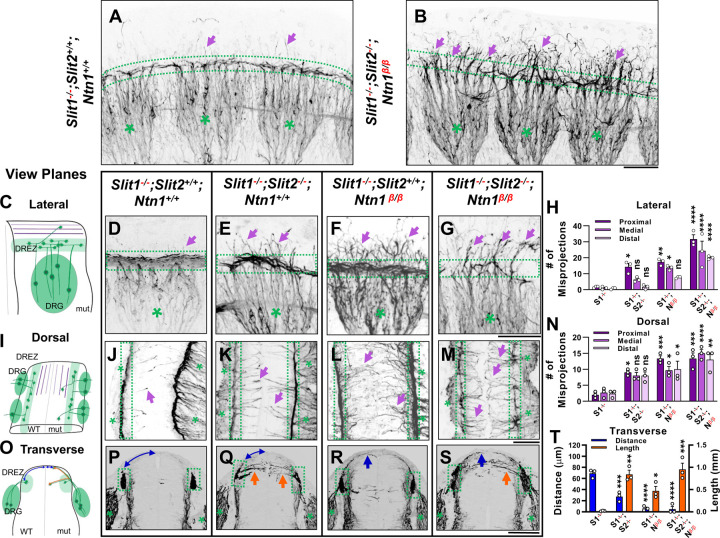Fig. 3. Wholemount NF immunostaining reveals the loss of the dorsal funiculus in Slit1−/−;Slit2−/−;Ntn1β/β triple mutants with distinct misprojections.
(A-B) Inverted fluorescent images of NF staining in CUBIC-cleared E10.5 embryos in the forelimb region. The dorsal funiculus (between dotted-lines) is evident in the control Slit1−/−;Slit2+/+;Ntn1+/+ embryo and the space above it has few labeled fibers (arrows, A), but in the Slit1−/−;Slit2−/−; Ntn1β/β mutant (B), extensive NF-labeled axons (arrows) wander into the dorsomedial region of the spinal cord while the dorsal funiculus (between dotted-lines) is reduced and diminished. DRGs are marked by green asterisks (*).
(C-N) Inverted fluorescent images of NF staining in wholemount embryos of E10.5 embryos with various genotypes are viewed from the lateral side (D-G) or the dorsal surface (J-M). Arrows denote sensory misprojections found in Slit1−/−;Slit2+/+;Ntn1+/+ (D,J, n=5), Slit1−/−;Slit2−/−;Ntn1+/+ (E,K, n=6), Slit1−/−;Slit2+/+; Ntn1β/β (F,L, n=8) and Slit1−/−;Slit2−/−;Ntn1β/β (G,M, n=3) animals. In Slit1−/−;Slit2−/−;Ntn1β/β triple mutants (G,M), the dorsal funiculus is nearly absent with misprojecting fibers. The number of axonal fibers at proximal, medial, and distal locations between the DREZ and the dorsal midline is quantified in the bar graphs from the lateral (H) or the top-down (N) view. The orientation and measurement location are shown in the corresponding cartoons (C and I) and DRGs are marked by green asterisks (*). Statistics from two-way ANOVA analysis in H: for proximal misprojections: Slit1−/− vs. Slit1−/−;Slit2−/− p=0.0122; Slit1−/− vs. Ntn1β/β p=0.0011; Slit1−/− vs. Slit1−/−;Slit2−/−;Ntn1β/β p<0.001; for medial misprojections: Slit1−/−vs. Ntn1β/β p=0.0122; Slit1−/− vs. Slit1−/−;Slit2−/−;Ntn1β/β p<0.0001; and for distal misprojections in Slit1−/− vs. Slit1−/−;Slit2−/−;Ntn1β/β p<0.0001. Statistics from two-way ANOVA analysis in I: for proximal misprojections: Slit1−/− vs. Slit1−/−;Slit2−/− p=0.0388; Slit1−/−vs. Ntn1β/β p=0.0002; Slit1−/− vs. Slit1−/−;Slit2−/−;Ntn1β/β p<0.0002; for medial misprojections: Slit1−/−vs. Ntn1β/β p=0.0388; Slit1−/− vs. Slit1−/−;Slit2−/−;Ntn1β/β p<0.0001; and for distal misprojections in Slit1−/−vs. Ntn1β/β p=0.0175; Slit1−/− vs. Slit1−/−;Slit2−/−;Ntn1β/β p=0.0004.
(O-T) Inverted fluorescent images of NF staining in cross sections of E10.5 embryos with various genotypes (P-S, n=3, except n=4 for Ntn1β/β). Orange arrows indicate axonal misprojections found in Slit1−/−;Slit2−/− mutants inside the spinal cord and blue arrows indicate misprojections associated with Ntn1β/β mutants at the pial surface. Blue lines with arrow at both ends indicate the distance from dorsal projections to the midline. Quantification of defects (T) is based on the distance of the dorsal fibers from the midline (blue bars) and the length of misprojection fibers inside the spinal cord (orange bars). The cartoon (O) illustrates the two types of misprojections (brown lines) and the quantification of dorsal distance (blue lines). One-way ANOVA: for horizontal, F= 18.34, df=3, and p=0.0006; for dorsal, F=44.16, df=3, and p<0.0001.
* p<0.05, ** p<0.01, *** p<0.001 and **** p<0.0001, ns, not significant. Bars: 100 μm.

